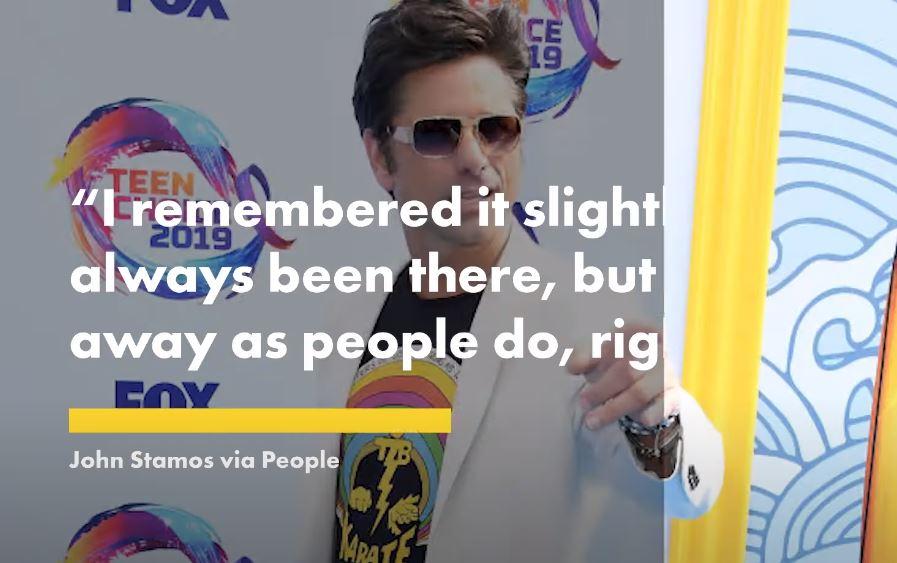John Stamos Babysitter Story – Overcoming Childhood Trauma and Personal Struggles is the title of John Stamos’s candid memoir. In his recently published memoir, “If You Would Have Told Me,” beloved actor John Stamos reveals his traumatic childhood experience of sexual abuse in a shocking revelation. This profoundly personal and frank account explores his 40-year career, marriages, and journey to sobriety. Join us as we delve into John Stamos’ courageous disclosure, the complexities of delayed disclosure, and his inspiring journey to healing and self-discovery.

In his new memoir, If You Would Have Told Me, John Stamos reveals that his childhood babysitter sexually assaulted him. At the time, he was seven years old, and the abuse persisted for several months.
Stamos revealed that he concealed the abuse for many years out of humiliation and fear. Additionally, he was concerned that no one would believe him. Not until he was in his forties did he eventually tell his sister what had occurred.
Stamos stated that he is sharing his story to assist other sexual assault victims. He desires for them to realize they are not alone and that there is hope.
“I’m not a victim anymore,” Stamos said. “I’m a survivor.”
The narrative of Stamos serves as a reminder that sexual abuse can affect people of any age, gender, or social standing. It also serves as a reminder that it is never too late to report maltreatment.
Disclosure of Childhood Trauma
John Stamos, best known for his roles in “Full House” and “You,” was abused by a babysitter during his upbringing. In his autobiography, he recounts the unsettling childhood moments when his babysitter’s behavior took a disturbing turn. The strength required to confront traumatic experiences is illuminated by Stamos’s moving revelation.
Delayed Revelation
The story of Stamos exemplifies the phenomenon known as “delayed disclosure.” It is common for survivors of child sexual abuse to disclose their traumatic experiences years or even decades later. This delay may be caused by the perpetrator’s grooming, manipulation, and the victim’s burden of remorse and shame. This revelation serves as a reminder of the difficult path survivors must traverse in order to disclose their experiences.

Advocacy and Recovery
John Stamos has been an advocate for child abuse prevention for over two decades, dedicating his time to the non-profit organization ChildHelp. This dedication to protecting children and assisting survivors played a crucial role in his decision to share his story. He was able to revisit his past, comprehend the gravity of the abuse, and embark on a path of recovery by writing his memoir.
The Value of Communication
The memoir of Stamos emphasizes the significance of open conversations about sexual abuse in infancy. Parents can protect their children by employing correct anatomical terminology, teaching them about boundaries, and underscoring the necessity of reporting any uncomfortable situations. Eliminating the stigma associated with these topics encourages children to share their experiences.
Personal Development and Recovery
The autobiography of Stamos discusses not only his traumatic past but also his path to personal development and recovery. It highlights how self-reflection, acceptance, and seeking assistance can lead to rehabilitation. The actor’s story illustrates how sharing one’s past can motivate others to accept their own experiences and seek help.
Redemption and Adaptability
The book demonstrates John Stamos’ fortitude in overcoming not only his childhood trauma but also his personal struggles. His journey from addiction to recovery and from a difficult divorce to personal development offers hope and inspiration to those enduring their own difficulties.
John Stamos’s autobiography, “If You Would Have Told Me,” is a compelling demonstration of the courage required to confront the past. His story of delayed disclosure and personal development inspires an important dialogue about sexual abuse in childhood and the significance of seeking assistance. By sharing his own experiences, Stamos encourages others to embark on their own paths to recovery, demonstrating that even after years of seclusion, healing is possible.




